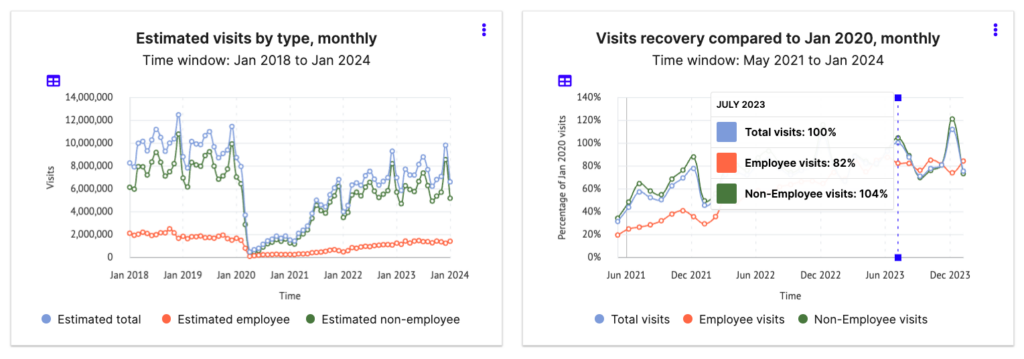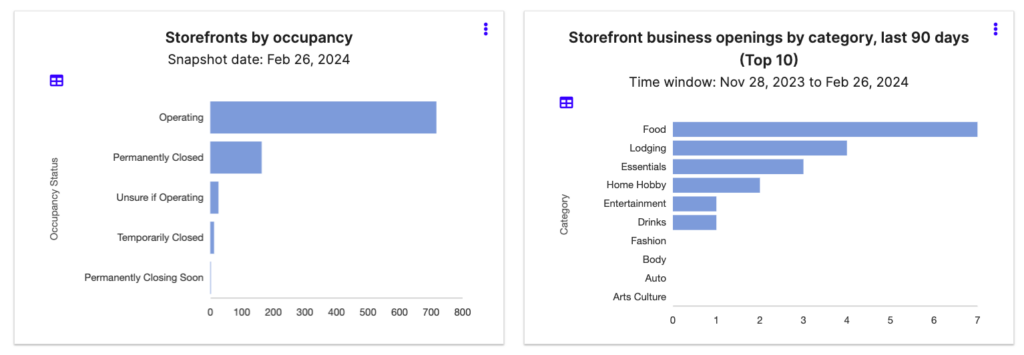How UrbanLogiq Supports Business Improvement Districts
Economic development professionals have a wide range of responsibilities. From supporting local business growth and managing funding opportunities — to supporting infrastructure improvements, and undergoing long-term planning. Their efforts are pivotal in propelling sustainable development and helping communities thrive. In this landscape, access to relevant, comprehensive, and up-to-date data is paramount for informed decision-making.
UrbanLogiq stands at the forefront of empowering these professionals with the data they need for:
- Analyzing foot traffic trends (for example, pre and post-COVID-19)
- Evaluating the impact of significant events (for example, holidays or festivals)
- Monitoring the dynamics of “Return to Office” movements
- Making business cases in grant applications
- Liaising with real estate brokers about local business listings
- And more
UrbanLogiq’s innovative software combines spatial and alternative data sources to provide local economic insights. Our flexible use cases help economic development professionals access, manage, and analyze the right data to effectively serve their communities better.
Case Study: The City of New York Business Improvement Districts (BIDs)
The UrbanLogiq platform provides New York City Business Improvement Districts with a central platform to analyze and report on business activity within their district.
It aims to streamline operations, improve data accuracy, and foster collaboration among all NYC BIDs. The platform aggregates open data sets from the city (such as 311 service requests, permits, and violations), alongside monthly foot traffic data and insights on business dynamics.
“The New York Places Hub has made data accessibility much more seamless and easier for me to understand what is going on in the BID and how we can work with our unique partners to serve them better. Leading a small BID myself, this was previously a very manual task associated with spending a lot of time on low-value data tasks instead of implementing solutions, programs, and services for West Village businesses,” Zach Owens, Executive Director of West Village BID, New York City.
Key benefits for the City of New York’s BIDs include:
- Enhancing the accessibility of New York 311 data
- Centralizing third-party data sources (like foot traffic) for comprehensive analysis
- Access to business count and business mix data
- Visualizing all BID businesses geospatially
- Inventory and fast insights on storefront openings and vacancies
- Records management for data governance
Building a Case With Data: 311 Data
Economic development managers play a crucial role in securing funding for community projects, with their success largely dependent on the strength of their proposals. Consider a scenario where illegal parking is affecting local businesses. In this context, the ability to obtain grants for installing new parking meters is crucial.
Here is how you could make a compelling case using UrbanLogiq:
- Select your BID and generate a report.

2. Analyze the “Issues by Type” chart for parking violations.

311 reports indicate 888 cases of illegal parking
3. Export the data as a PDF to present to local council members, demonstrating the need for intervention.

Building a Case With Data: Foot Traffic Insights
Understanding shifts in foot traffic is vital for assessing the health and appeal of BIDs. However historically, this data is hard to come by. One method is to conduct annual or biannual pedestrian count surveys. One BID manager describes this data collection approach as “expensive and limiting.”
UrbanLogiq leverages data partnerships to provide foot traffic trends, enabling BIDs to strategize effectively, whether it’s enhancing public spaces, optimizing event planning, or improving safety measures.
Did you know? UrbanLogiq is ‘data agnostic’, meaning we have no formal agreements or bias towards any specific data providers. We care only about sourcing the best data for your agency’s needs.
Building a Case With Data: Understanding the “Return to Office” Landscape
As cities adapt to post-pandemic realities, many economic development professionals are seeking to measure how the number of employees working “in the office” compares to the pre-pandemic environment. UrbanLogiq provides key metrics to measure employee and non-employee visits to BIDs, supporting planning for a resilient and vibrant economic recovery.

Building a Case With Data: Understanding Business Dynamics for Real Estate Engagement
UrbanLogiq provides insights into the lifecycle of businesses within BIDs — reporting on openings, closures, and businesses by type. This intelligence is especially valuable for communicating with real estate brokers, offering a data-backed overview of the business environment. This perspective helps identify emerging opportunities, and trends to address potential challenges proactively.

“Every business, regardless of size or resources, deserves access to data that can pave their way to success. UrbanLogiq was born out of a vision to level the playing field: turning data into actionable strategies that empower users to navigate challenges and seize opportunities. We’re not just offering technology; we’re bridging the gap between data insights and actionable outcomes,” Mark Masongsong, CEO of UrbanLogiq.
Want to Learn More?
UrbanLogiq is committed to empowering economic development professionals with the insights needed to foster thriving communities. Discover how our platform can transform your data into actionable intelligence.
Schedule a demo today to explore UrbanLogiq’s full capabilities and how we can tailor our solution to meet your unique needs.



